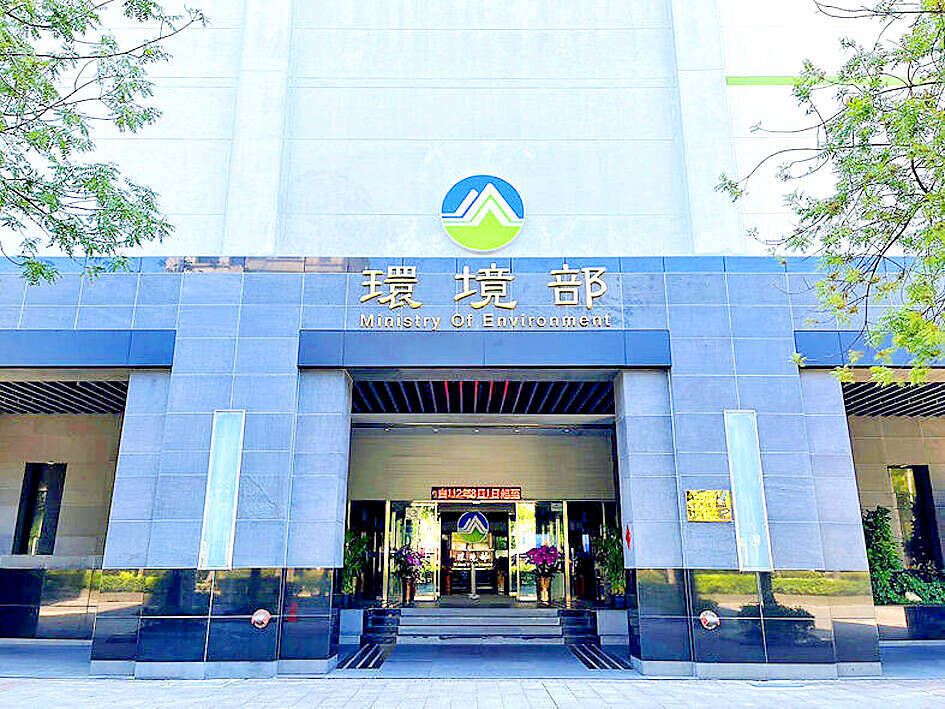The Ministry of Environment said it has requested the Keelung City Government to investigate claims that Taiwan Power Co (Taipower) concealed excessive heavy metal contamination in soil during renovations at the Hsieh-ho Power Plant (協和電廠).
The ministry made the announcement after environmental groups on Thursday said Taipower was covering up the project’s heavy metal pollution, calling on the ministry and the city government to initiate an investigation in case the company destroys evidence.
The total petroleum hydrocarbon (TPH) pollutants in the project area were found to be eight times higher than the acceptable concentration in 2017 and were listed by the city government for supervision the following year, Waimushan Conservation Action convener Wang Hsing-chih (王醒之) said, citing information from a Taipower whistle-blower, who asked to remain anonymous.

Photo: Chen Chia-yi, Taipei Times
The supervision was lifted in 2019 after what was deemed necessary response measures were taken, but TPH pollutants rose to 54 times the maximum acceptable concentration in 2021, he said, adding that the ministry, the city government during the tenure of former mayor Lin Yu-chang (林右昌) and the Soil Pollution and Groundwater Pollution Remediation Fund were reportedly aware of the situation.
Wild at Heart Legal Defense Association chairman Chen Hsien-cheng (陳憲政) cited Taipower as saying at environmental impact assessment (EIA) meetings that the soil sampling conducted in December in 2019 showed that the pollutant concentrations were lower than regulatory standards.
However, the company’s own examination report showed that it had identified pollution spots as early as August of the same year, he said.
The pollution spots were in areas where the soil samples were collected, yet they appeared to have been intentionally excluded by Taipower, Chen said.
The ministry said that new evidence should not affect EIAs and the EIA committee members did not review the evidence of excessive pollutants, he said.
Association attorney Tsai Ya-ying (蔡雅瀅) cited the whistle-blower as saying that heavy metal pollutants in the project’s soils, such as chromium, copper, zinc, nickel and arsenic exceeded their maximum acceptable concentrations.
Pacific Engineers and Constructors (泰興工程), the company commissioned to compile the EIA report for the project, allegedly taught Taipower how to leave out pollution spots by “turning the soils” or “removing the spots,” she said.

A preclearance service to facilitate entry for people traveling to select airports in Japan would be available from Thursday next week to Feb. 25 at Taiwan Taoyuan International Airport, Taoyuan International Airport Corp (TIAC) said on Tuesday. The service was first made available to Taiwanese travelers throughout the winter vacation of 2024 and during the Lunar New Year holiday. In addition to flights to the Japanese cities of Hakodate, Asahikawa, Akita, Sendai, Niigata, Okayama, Takamatsu, Kumamoto and Kagoshima, the service would be available to travelers to Kobe and Oita. The service can be accessed by passengers of 15 flight routes operated by

MORE FALL: An investigation into one of Xi’s key cronies, part of a broader ‘anti-corruption’ drive, indicates that he might have a deep distrust in the military, an expert said China’s latest military purge underscores systemic risks in its shift from collective leadership to sole rule under Chinese President Xi Jinping (習近平), and could disrupt its chain of command and military capabilities, a national security official said yesterday. If decisionmaking within the Chinese Communist Party has become “irrational” under one-man rule, the Taiwan Strait and the regional situation must be approached with extreme caution, given unforeseen risks, they added. The anonymous official made the remarks as China’s Central Military Commission Vice Chairman Zhang Youxia (張又俠) and Joint Staff Department Chief of Staff Liu Zhenli (劉振立) were reportedly being investigated for suspected “serious

Taiwanese and US defense groups are collaborating to introduce deployable, semi-autonomous manufacturing systems for drones and components in a boost to the nation’s supply chain resilience. Taiwan’s G-Tech Optroelectronics Corp subsidiary GTOC and the US’ Aerkomm Inc on Friday announced an agreement with fellow US-based Firestorm Lab to adopt the latter’s xCell, a technology featuring 3D printers fitted in 6.1m container units. The systems enable aerial platforms and parts to be produced in high volumes from dispersed nodes capable of rapid redeployment, to minimize the risk of enemy strikes and to meet field requirements, they said. Firestorm chief technology officer Ian Muceus said

Alain Robert, known as the "French Spider-Man," praised Alex Honnold as exceptionally well-prepared after the US climber completed a free solo ascent of Taipei 101 yesterday. Robert said Honnold's ascent of the 508m-tall skyscraper in just more than one-and-a-half hours without using safety ropes or equipment was a remarkable achievement. "This is my life," he said in an interview conducted in French, adding that he liked the feeling of being "on the edge of danger." The 63-year-old Frenchman climbed Taipei 101 using ropes in December 2004, taking about four hours to reach the top. On a one-to-10 scale of difficulty, Robert said Taipei 101